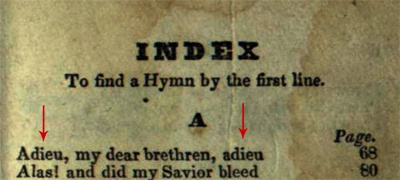
FAIR is a non-profit organization dedicated to providing well-documented answers to criticisms of the doctrine, practice, and history of The Church of Jesus Christ of Latter-day Saints.
m (→External links) |
|||
| Line 92: | Line 92: | ||
===External links=== | ===External links=== | ||
*" | *"How is it that the Book of Mormon prophet Jacob ends his account with the French word 'adieu'?]", ''farms.byu.edu'' (accessed 14 June 2006).{{link|url=http://farms.byu.edu/questionday.php?id=1 }} | ||
*Jeff Lindsay, "Why does the Book of Jacob end with a French word?]", ''lightplanet.com'' (accessed 14 June 2006).{{link|url=http://www.lightplanet.com/mormons/response/qa/bom_french.htm}} | |||
*Edward J. Brandt, | *{{Ensign1|author=Edward J. Brandt|article=Why are the words ''adieu, bible,'' and ''baptize'' in the Book of Mormon? These words weren't known in Book of Mormon times|date=October 1985|start=17}} {{link|url=http://library.lds.org/library/lpext.dll/ArchMagazines/Ensign/1985.htm/ensign%20october%201985%20.htm/i%20have%20a%20question.htm?fn=document-frame.htm&f=templates&2.0#LPTOC1}} | ||
===Printed material=== | ===Printed material=== | ||
*Daniel C. Peterson, "Is the Book of Mormon True? Notes on the Debate," in ''Book of Mormon Authorship Revisited: The Evidence for Ancient Origins'' (chapter 6), edited by Noel B. Reynolds, (Provo: FARMS, 1997). {{GL|url=http://gospelink.com/library/doc?doc%5fid=264962}} | *Daniel C. Peterson, "Is the Book of Mormon True? Notes on the Debate," in ''Book of Mormon Authorship Revisited: The Evidence for Ancient Origins'' (chapter 6), edited by Noel B. Reynolds, (Provo: FARMS, 1997). {{GL|url=http://gospelink.com/library/doc?doc%5fid=264962}} | ||
Jacob 7:27 ends with the phrase, "Brethren, adieu." Critics claim that because adieu is French, it shows that Joseph Smith composed the Book of Mormon, and not an ancient author.
The Book of Mormon is a translation. This means that it is no more likely that the word adieu appeared on the plates than the words yea, beginning, or sword.
Adieu is Joseph's translation of a concept expressed by Jacob. In French, adieu implies "farewell until we meet with God." This is a fitting finale to Jacob's testimony and writing.
Joseph Smith was likely unaware that adieu was a French word. Like many words that were originally French, adieu was adopted into English— it was in use by at least 1374.
In 1737, William Whiston (1667-1752) produced a translation of The Life of Flavius Josephus, written by a Jew born in Jerusalem in A.D. 37. Whiston's translation reads, in part:
Presumably, the critics would have us believe that Whiston is claiming that Josephus, a first century Jew, spoke French (a language not yet invented) because he uses the term adieu?
William Shakespeare is nothing if not an English writer. He uses adieu frequently in his plays:
There are over a hundred other examples.off-site

Thomas Jefferson's original draft of the Declaration of Independence read, in part (beginning shown in image by blue underline):
Jefferson later crossed out "everlasting Adieu," and replaced it with "eternal separation."[2]
Noah Webster's 1828 American dictionary demonstrates that adieu was perfectly good English the year prior to the Book of Mormon's translation:
ADIEU', Adu'.
- Farewell; an expression of kind wishes at the parting of friends.
ADIEU', n. A farewell, or commendation to the care of God; as an everlasting adieu.
The Wesley brothers, founders of Methodism, used adieu in some of their hymns:
Furthermore, John Wesley was fond of adieu, using it many times in his personal letters. A few examples follow; more are availableoff-site

Closer to home, hymn #52 (penned by a non-LDS author) collected by Emma Smith for the use of the Church, adieu is used twice in the first line:
Clearly, this was a word familiar to Joseph and his contemporaries. The Church's the Times and Seasons periodical used the word 19 times.
"Adieu" is simply one English word among many in the Book of Mormon translation. It was in common use among members and non-members in Joseph's era. Critics try to confuse this issue simply because its French origins are more apparent to the general reader. All its presence indicates is that the concept which Jacob intended to communicate was "farewell forever, or until we meet God."
The critics' complaints on this point demonstrate how desperate they are to find fault.

FAIR is a non-profit organization dedicated to providing well-documented answers to criticisms of the doctrine, practice, and history of The Church of Jesus Christ of Latter-day Saints.
We are a volunteer organization. We invite you to give back.
Donate Now